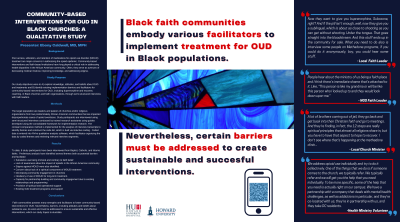Back


(36) Community-Based Interventions for OUD in Black Churches: A Qualitative Study
Friday, April 1, 2022
11:30 AM – 1:00 PM ET
Location: Great Hall Foyer, Third Floor

Has Audio

Ebony F. Caldwell, MD, MPH
Chief Resident/ House Staff Officer
Howard University Hospital, District of Columbia
Presenter(s)
Background:
Poor access, utilization, and retention of medications for opioid use disorder (MOUD) treatment are major concerns in addressing the opioid epidemic, particularly in medically neglected, economically disadvantaged, and predominately African-American communities. This has contributed to increasing numbers of overdoses clustered in these communities. Community-based interventions and faith-based institutions have long played a critical role in addressing health disparities in the African American community, including mental and substance use disorders. Often, they serve as avenues of decreasing medical mistrust, improving knowledge, and addressing stigma. Our study objectives were to A) explore knowledge, attitudes, and beliefs about OUD and treatments and B) identify existing implementation barriers and facilitators for community-based interventions for OUD in Black churches through semi-structured interviews with faith leaders.
Methods:
The target population are leaders and pastors of churches and/or religious organizations from two predominately African American communities that are impacted by high crime, poor healthcare access, and disproportionate cases of opioid overdoses. The recruitment process, which included community presentations, flyers, and referrals from community advisory board members, began in December 2019 and is ongoing. Study participants are interviewed using semi-structured interviews conducted by trained research assistants using guides developed using the consolidated framework for implementation research. All interviews are recorded, de-identified, and transcribed. The constant comparative method is implemented for the analysis of interview transcripts to identify themes and construct the code list, which is built via inductive coding. Two researchers independently code each interview, for both expansion of the code list and to determine inter-rater reliability. Coded data is entered into NVivo qualitative analysis software, which facilitates organizing the data by coded themes and retrieving relevant interview segments.
Results:
To date, 8 study participants have been interviewed, representing various faith communities including Baptist, Catholic, and Islamic faiths. Participants vary in roles from volunteers to ordained pastors. Preliminary analysis identified a common theme of substance use being immoral and contrary to faith beliefs. Lack of awareness about the impact of opioids in the African American community and stigma against MOUD were also identified. Barriers of implementation included concern about lack of a spiritual component of MOUD, decreasing community engagement in churches, and hesitancy of use of MOUD for long-term treatment. Common facilitating factors included 1) the capacity for partnership building and community engagement due to existing relationships and programming (such as free meals and health ministries); 2) provision of spiritual and operational support; and 3) existing SUD treatment programs such as AA/NA meetings and day treatment programs.
Conclusions:
Community-based interventions for OUD treatment in Black churches have a significant potential to decrease the burden of OUD in African American communities by increasing access to MOUD, decreasing opioid-related overdoses, and alleviating the adverse bio-psycho-social effects of untreated OUD. Faith communities possess many strengths and facilitators to foster community-based interventions for OUD. Nevertheless, barriers, including attitudes and beliefs about substance use, do exist and must be addressed to ensure sustainable and effective interventions, which our study hopes to elucidate.
References:
Alford DP, LaBelle CT, Kretsch N, et al. Collaborative care of opioid-addicted patients in primary care using buprenorphine: five-year experience. Arch Intern Med. 2011;171(5):425-431. doi:10.1001/archinternmed.2010.541
Bradley EH, Curry LA, Devers KJ. Qualitative data analysis for health services research: developing taxonomy, themes, and theory. Health Serv Res. 2007;42(4):1758-1772. doi:10.1111/j.1475-6773.2006.00684.x
Kiang MV, Basu S, Chen J, Alexander MJ. Assessment of Changes in the Geographical Distribution of Opioid-Related Mortality Across the United States by Opioid Type, 1999-2016. JAMA Netw Open. 2019;2(2):e190040. doi:10.1001/jamanetworkopen.2019.0040
Taylor RJ, Ellison CG, Chatters LM, Levin JS, Lincoln KD. Mental health services in faith communities: the role of clergy in black churches. Soc Work. 2000;45(1):73-87. doi:10.1093/sw/45.1.73
Substance Abuse and Mental Health Services Administration. The opioid crisis and the Black/African American population: An urgent issue. U.S. Department of Health and Human Services. Office of Behavioral Health Equity.2020;PEP20-05-02-001.
Poor access, utilization, and retention of medications for opioid use disorder (MOUD) treatment are major concerns in addressing the opioid epidemic, particularly in medically neglected, economically disadvantaged, and predominately African-American communities. This has contributed to increasing numbers of overdoses clustered in these communities. Community-based interventions and faith-based institutions have long played a critical role in addressing health disparities in the African American community, including mental and substance use disorders. Often, they serve as avenues of decreasing medical mistrust, improving knowledge, and addressing stigma. Our study objectives were to A) explore knowledge, attitudes, and beliefs about OUD and treatments and B) identify existing implementation barriers and facilitators for community-based interventions for OUD in Black churches through semi-structured interviews with faith leaders.
Methods:
The target population are leaders and pastors of churches and/or religious organizations from two predominately African American communities that are impacted by high crime, poor healthcare access, and disproportionate cases of opioid overdoses. The recruitment process, which included community presentations, flyers, and referrals from community advisory board members, began in December 2019 and is ongoing. Study participants are interviewed using semi-structured interviews conducted by trained research assistants using guides developed using the consolidated framework for implementation research. All interviews are recorded, de-identified, and transcribed. The constant comparative method is implemented for the analysis of interview transcripts to identify themes and construct the code list, which is built via inductive coding. Two researchers independently code each interview, for both expansion of the code list and to determine inter-rater reliability. Coded data is entered into NVivo qualitative analysis software, which facilitates organizing the data by coded themes and retrieving relevant interview segments.
Results:
To date, 8 study participants have been interviewed, representing various faith communities including Baptist, Catholic, and Islamic faiths. Participants vary in roles from volunteers to ordained pastors. Preliminary analysis identified a common theme of substance use being immoral and contrary to faith beliefs. Lack of awareness about the impact of opioids in the African American community and stigma against MOUD were also identified. Barriers of implementation included concern about lack of a spiritual component of MOUD, decreasing community engagement in churches, and hesitancy of use of MOUD for long-term treatment. Common facilitating factors included 1) the capacity for partnership building and community engagement due to existing relationships and programming (such as free meals and health ministries); 2) provision of spiritual and operational support; and 3) existing SUD treatment programs such as AA/NA meetings and day treatment programs.
Conclusions:
Community-based interventions for OUD treatment in Black churches have a significant potential to decrease the burden of OUD in African American communities by increasing access to MOUD, decreasing opioid-related overdoses, and alleviating the adverse bio-psycho-social effects of untreated OUD. Faith communities possess many strengths and facilitators to foster community-based interventions for OUD. Nevertheless, barriers, including attitudes and beliefs about substance use, do exist and must be addressed to ensure sustainable and effective interventions, which our study hopes to elucidate.
References:
Alford DP, LaBelle CT, Kretsch N, et al. Collaborative care of opioid-addicted patients in primary care using buprenorphine: five-year experience. Arch Intern Med. 2011;171(5):425-431. doi:10.1001/archinternmed.2010.541
Bradley EH, Curry LA, Devers KJ. Qualitative data analysis for health services research: developing taxonomy, themes, and theory. Health Serv Res. 2007;42(4):1758-1772. doi:10.1111/j.1475-6773.2006.00684.x
Kiang MV, Basu S, Chen J, Alexander MJ. Assessment of Changes in the Geographical Distribution of Opioid-Related Mortality Across the United States by Opioid Type, 1999-2016. JAMA Netw Open. 2019;2(2):e190040. doi:10.1001/jamanetworkopen.2019.0040
Taylor RJ, Ellison CG, Chatters LM, Levin JS, Lincoln KD. Mental health services in faith communities: the role of clergy in black churches. Soc Work. 2000;45(1):73-87. doi:10.1093/sw/45.1.73
Substance Abuse and Mental Health Services Administration. The opioid crisis and the Black/African American population: An urgent issue. U.S. Department of Health and Human Services. Office of Behavioral Health Equity.2020;PEP20-05-02-001.
